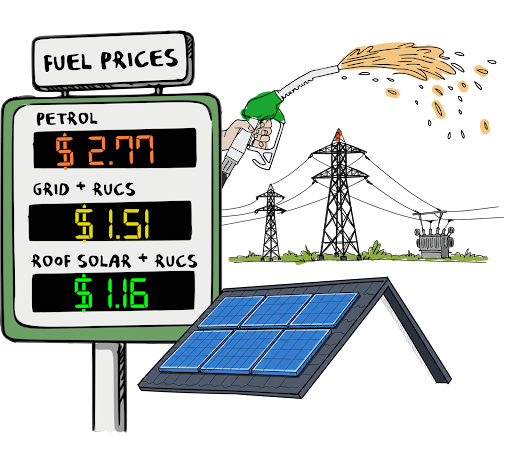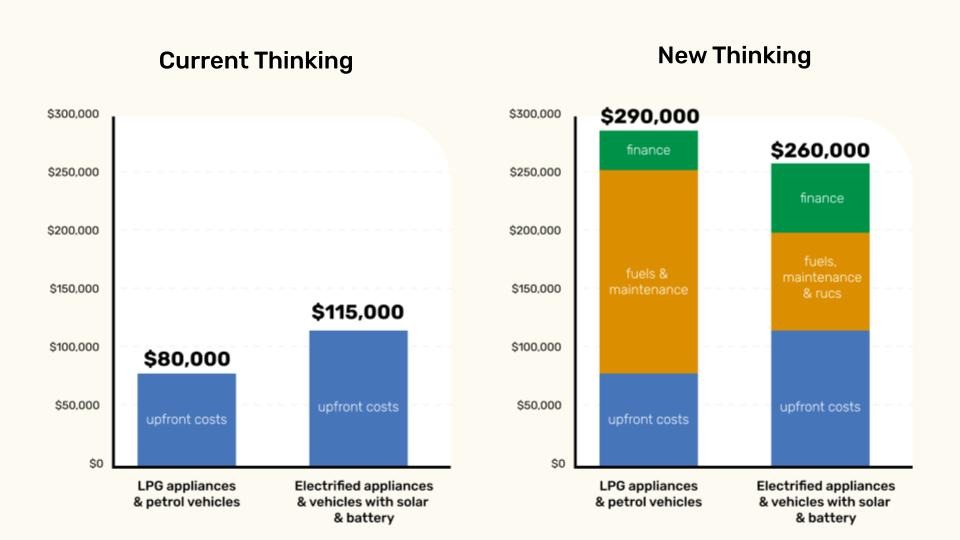The case for energy loans: read our latest explainer



The Government’s changes to the Clean Car Standard are a gift to the fossil fuel industry that will lock New Zealanders into buying expensive foreign fuels for years to come. But they don’t change the fact that, on average, electric vehicles are cheaper over their lifetime.
In many cases, buying a petrol vehicle now is like buying a Blackberry after the iPhone was released - and paying more for it each month! You’re simply investing in the wrong tech. And it makes very little sense for New Zealand to continue its reliance on imported oil when we could instead be running off cheaper, locally-made electrons.
While we don’t believe loosening the standards is a good decision, the Transport Minister Chris Bishop summed up our position on EVs succinctly in the press conference after the policy was announced.
“I love EVs. We’re a two EV family. They make sense and ultimately, over time, they will be good for New Zealand, and the running costs of them are lower. They’re good. They’re fun to drive and for a country like New Zealand with 85 percent renewable electricity, they make a huge amount of sense.”
While this urgent change was supposedly aimed at lowering the cost of living, it is likely to lump customers that decide to buy petrol or diesel cars with a more expensive energy subscription. EVs are cheaper to ‘fill’ and maintain, so incentivising them would be a more effective approach.

We need to look at the total cost of ownership, rather than the sticker price. And in our homes and with cars, electric equivalents cost much less than fossil fuel machines in the long run - even when you include the upfront costs, interest and ongoing cost of energy to run them.

We were not fans of how the Clean Car Discount divided people or how it was implemented, but we would definitely be fans of ‘Energy Security Loans’. The Government could easily bring the cost of living down and shore up our energy security by giving New Zealanders access to long-term, low-interest finance for electric upgrades that are run on cheap New Zealand energy, rather than expensive, imported molecules.
Even if these changes do reduce the upfront cost of imported fossil fuel vehicles, there’s also no guarantee importers will pass these savings on to customers. Just as we can’t rely on the goodwill of large gentailers to reduce the cost of electricity for customers, we should not rely on vehicle importers to reduce the cost of cars when they get them for less.
As we’ve seen around the world, policies that incentivise or disincentivise EV adoption have a huge influence on demand. In New Zealand, EV demand took a hit because of a series of government decisions and signals that upped costs and spooked the market.
The Government should be focused on how to get EV uptake growing again like we're seeing in most markets around the world (including in Australia, which has the same fuel efficiency standards as the CCS).
Our EV market needs a nudge to get momentum back - both for new and second-hand EVs. The tipping point is close and shifting to electric vehicles will permanently unlock cheaper transport, increased fuel security, and lower emissions. It’s good to see proposed changes to the Road User Charges system that will remove a loophole for hybrids and make EVs cheaper in comparison.
Instead, this decision has just delayed the inevitable EV transition. It will cost Kiwis and the New Zealand economy, and it will mean people will need to wait longer for a second-hand EV.
It’s common sense, but to change the fleet you need to change the vehicles entering the fleet. It will happen, as it’s happening everywhere else - from wealthy places like Norway to emerging economies like Indonesia, Thailand and Turkey - but these changes mean that transition will take longer.

Everyone is rocking on down to Electric Avenue today (this one online, not that other small one in Hagley Park in Christchurch), so let's ride the lightning: profits and electricity prices keep going up, as panels keep going down; a new paper puts a number on how much more homes with solar sell for; we're bottling things up with big and small batteries and they are eating into gas in Australia and California; transport emissions drop across the Tasman as a result of Government EV incentives, while HEB Construction electrifies its fleet; electrons are coming from above in China; and Xpeng announces the arrival of a crazy looking electric van/aircraft carrier.
Read moreDownload
Warren G and Nate Dogg said it best when they said: 'Regulators, mount up!' - and this week, they have.In a rare joint open letter, three different regulators - EECA (Energy Efficiency and Conservation Authority), the Commerce Commission and the Electricity Authority - have basically told the lines companies to pull their socks up and make the most of ‘non-network solutions’ (AKA stop building more expensive poles and wires and start looking at customers and new technology as part of the solution!).
Read moreDownload
"The LNG announcement from earlier this month has set the stage: electricity, and the energy sector more broadly, is set to be a major election issue this year. Casey has compared electricity to telecommunications, an area where services have become much cheaper in the last decade with technology advancing. “There are supply challenges for the grid and natural gas, and increasing pressure to find sustainable alternatives as reliance on fossil fuels becomes less viable,” he wrote in a Newsroom piece earlier this month, heralding the “electric election”.
Read moreDownload